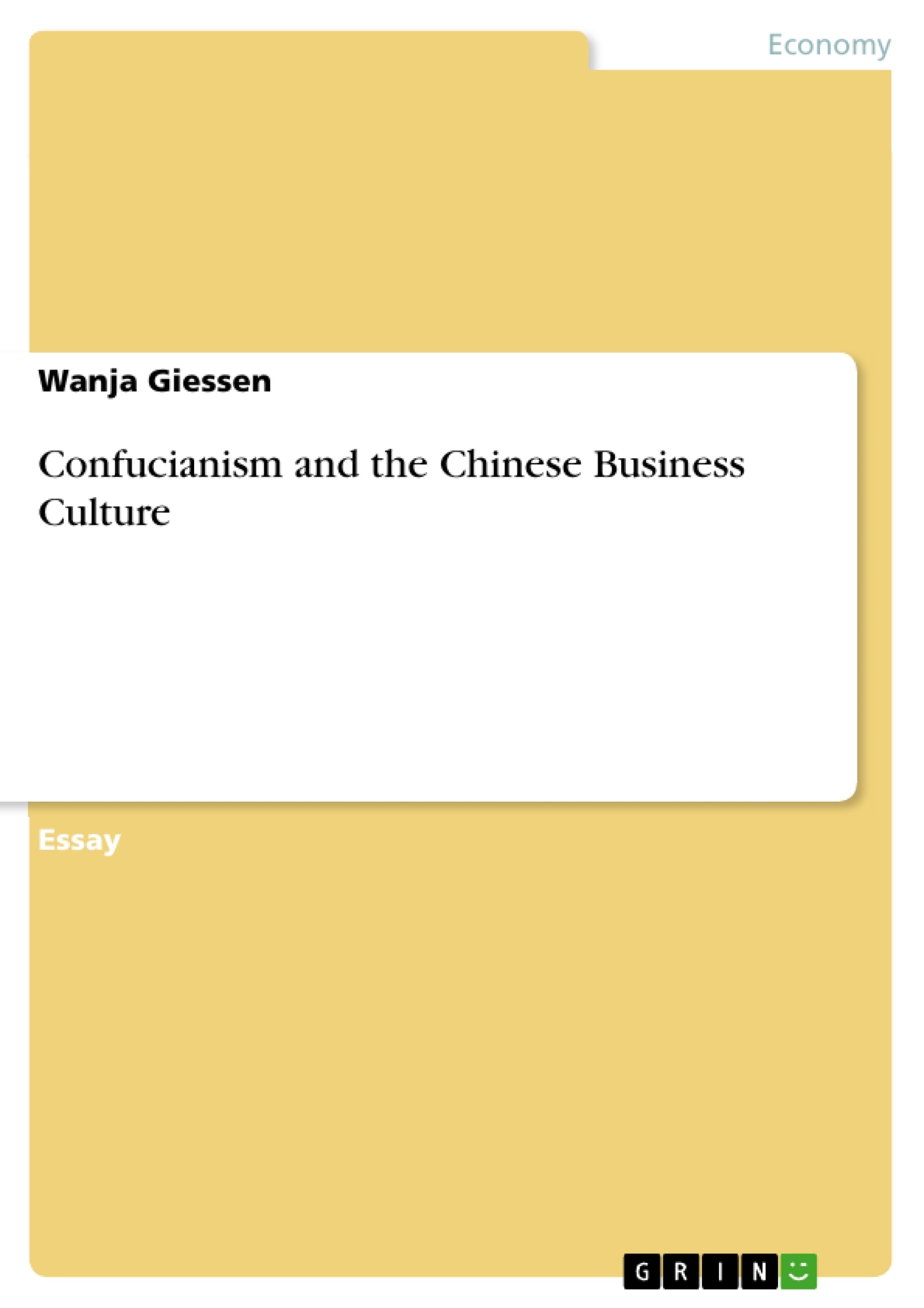In the last decades, globalization – the increased interconnectedness among countries all over the world – became more and more important in the fields of politics, economics and in cultural contexts. In current times, China exhibits a unique role, being the world's manufacturing powerhouse in economic terms while maintaining a strong, traditional culture. Foreign companies seeking to exploit the advantages the Chinese economy promises must adapt to the cultural characteristics of Chinese firms. The influence of Confucianism is the key difference between Western and Eastern companies – this has to be taken into respect when trying to enter the Chinese market and when planning to begin strong relationships with Chinese companies. This essay will highlight the core elements of Confucianism, their impact on Chinese business culture and managerial implications that can be drawn from these observations.
After highlighting the methodology and explaining how the author gained the respective knowledge about the topic, the roots of Confucianism are shown. The core elements of Confucianism are drawn to give the reader a detailed understanding of the implications Confucianism has on the Chinese culture and on the businesses that operate in it. The influence and the relevance of Confucianism on Chinese companies are shown. After that, positive and negative implications of Confucianism on the Chinese business culture are highlighted. Here, quantitative and qualitative findings are consulted to give a thoughtful evaluation of Confucianism in Chinese business culture.
Table of Contents
- 1 Introduction
- 1.1 Problem Definition and Objectives
- 1.2 Course of the Investigation
- 1.3 Methodology
- 2 Confucianism in the Chinese Culture
- 2.1 Roots of Confucianism
- 2.2 Core Elements of Confucianism
- 2.2.1 Moral Person (junzi)
- 2.2.2 Human Morality (ren, yi, and li)
- 2.2.3 Relationships (guanxi)
- 2.2.4 Face (mianzi)
- 3 Confucianism and the Chinese Business Culture
- 3.1 Effects and Relevance of Confucianism
- 3.2 Positive and Negative Implications of Confucianism on Businesses
- 3.2.1 Hierarchy and Harmony
- 3.2.2 Group Orientation
- 3.2.3 Past Orientation
- 3.2.4 Guanxi Network
- 3.2.5 Mianzi (Giving Face)
- 4 Outlook and Conclusion
- 4.1 Outlook
- 4.2 Conclusion
Objectives and Key Themes
This essay explores the influence of Confucianism on Chinese business culture. It examines the core elements of Confucianism and their impact on Chinese business practices, highlighting both positive and negative implications. The author aims to provide insights into the cultural differences between Western and Eastern companies and their implications for business interactions in the Chinese market.
- The core elements of Confucianism and their impact on Chinese culture.
- The influence and relevance of Confucianism on Chinese businesses.
- The positive and negative implications of Confucianism on business practices.
- The cultural differences between Western and Eastern companies.
- The importance of understanding cultural nuances for successful business interactions in the Chinese market.
Chapter Summaries
The introduction outlines the problem definition and objectives of the essay. It emphasizes the growing importance of globalization and the unique role of China as a manufacturing powerhouse with a strong cultural heritage. The chapter then discusses the need for foreign companies to adapt to the cultural characteristics of Chinese firms, particularly the influence of Confucianism.
Chapter 2 delves into the roots of Confucianism, tracing its origins to the teachings of Confucius. The chapter then explores the core elements of Confucianism, including the concept of the moral person (junzi), human morality (ren, yi, and li), relationships (guanxi), and face (mianzi).
Chapter 3 examines the effects and relevance of Confucianism on the Chinese business culture. It explores the positive and negative implications of Confucian values on business practices, including hierarchy and harmony, group orientation, past orientation, the guanxi network, and the concept of giving face (mianzi).
Keywords
Confucianism, Chinese business culture, guanxi, mianzi, hierarchy, harmony, group orientation, past orientation, cultural differences, globalization, Chinese economy, managerial implications.
Frequently Asked Questions
How does Confucianism influence Chinese business culture?
Confucianism emphasizes hierarchy, harmony, and group orientation, which directly shapes how Chinese companies are managed and how business relationships are built.
What is the meaning of "Guanxi" in business?
Guanxi refers to the complex network of personal and professional relationships and connections that are essential for conducting business successfully in China.
What does "Mianzi" (Face) signify in a corporate context?
Mianzi, or "giving face," is about maintaining social status and reputation. In business, it involves showing respect and avoiding public embarrassment for partners or superiors.
What are the core elements of Confucian morality?
The core elements include Ren (humaneness), Yi (righteousness), and Li (etiquette/propriety), which define the behavior of a "Junzi" or moral person.
Are there negative implications of Confucianism on business?
Yes, the essay highlights that a strong focus on hierarchy and past orientation can sometimes hinder innovation and slow down decision-making processes.
Why is hierarchy so important in Chinese firms?
Confucian values promote a clear social order where respect for seniority and authority is paramount to maintaining social and organizational harmony.
- Arbeit zitieren
- Wanja Giessen (Autor:in), 2013, Confucianism and the Chinese Business Culture, München, GRIN Verlag, https://www.grin.com/document/274349



